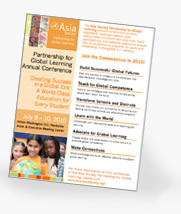Break-out Session
Guidelines and Procedures
As a breakout session leader, you will have an opportunity to share your knowledge and experiences, and gather valuable feedback from peers. Presenters can showcase programs and best practices to a national audience and help enact a national agenda for reform.
Please read the following guidelines and procedures carefully before submitting your proposal.
We are seeking proposals on the following topics:
- Curriculum: Innovative curriculum that develops literacy and numeracy in a global context for students
- Teacher Preparation: Strong models for preparing teachers to teach about the world
- Assessment: modern ways of measuring global learning
- Technology: Innovative uses of technology to connect students with the world
- Research: Implications of research on global competency in K-12 education
Preference will be given to proposals that:
- Present programs, services, or policies that improve educational access and success for all students
- Demonstrate best practices and examples of what works in an interactive manner
- Foster dialogue between educators from different professional areas
- Provide research and data to support claims and document outcomes
- Are not commercial in nature
We cannot consider submissions that do not meet these criteria:
- All sessions are scheduled for 60 minutes. Plan your session to allow for sufficient question and answer time.
- Presenters are responsible for their own travel and hotel arrangements and expenses, but are eligible for a discount on their registration fee.
- Presenters should be limited to three individuals.
Write Clear Session Descriptions
As you are writing your session description:
- Create a compelling session title that accurately describes your session
- Limit the session description to no more than 100 words.
- Focus on what participants will be doing, rather than what they will be receiving. Use action words such as “survey,” “review,” “assess,” and “examine” to keep the description centered on the participant experience.
- Write in general terms about the topic rather than reviewing the entire presentation.
- Emphasize what participants can do with the information and knowledge gained.
State the Learning Outcomes
Learning outcomes are keys to helping us understand the focus of your session. They also help participants determine which sessions to attend, based on specific needs. In order to develop an effective learning outcome:
- Clearly state and describe the actual skills participants will develop during the workshop, as well as specific ways the skills can be applied to the participants’ work.
- Make your learning outcomes tangible and concrete; they should be observable and assessable, if needed.
- Here are a few examples of effective learning outcomes:
- Participants will learn how to develop their own step-by-step guidelines for working with new teachers to achieve successful outcomes aligned with the overall goals of their program.
- Participants will walk away with concrete strategies for implementing engaging learning activities within a backward designed model.
- Participants will review strategies to bring K–12 and higher education together to build capacity and proficiency, which will enable them to improve K–16 articulation for their own programs.
Other Considerations
The Asia Society PGL Program Advisory Committee will review all proposals and notifications of acceptance will be sent via e-mail in March 2010.
If you have any questions, please send an e-mail to [email protected]
Deadline for Submission: Friday, March 12, 2010


